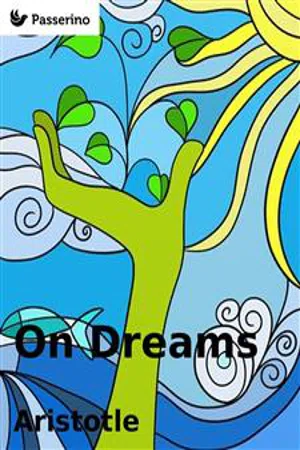eBook - ePub
On dreams
About this book
"On Dreams" is one of the short treatises that make up Aristotle's Parva Naturalia. Aristotle (384–322 BC) was a Greek philosopher and scientist. Translated by John Isaac Beare
Tools to learn more effectively

Saving Books

Keyword Search

Annotating Text

Listen to it instead
Information
Topic
PhilosophySubtopic
Ancient & Classical PhilosophyPart 1
We must, in the next place, investigate the subject of the dream, and first inquire to which of the faculties of the soul it presents itself, i.e. whether the affection is one which pertains to the faculty of intelligence or to that of sense-perception; for these are the only faculties within us by which we acquire knowledge.
If, then, the exercise of the faculty of sight is actual seeing, that of the auditory faculty, hearing, and, in general that of the faculty of sense-perception, perceiving; and if there are some perceptions common to the senses, such as figure, magnitude, motion, &c., while there are others, as colour, sound, taste, peculiar [each to its own sense]; and further, if all creatures, when the eyes are closed in sleep, are unable to see, and the analogous statement is true of the other senses, so that manifestly we perceive nothing when asleep; we may conclude that it is not by sense-perception we perceive a dream.
But neither is it by opinion that we do so. For [in dreams] we not only assert, e.g. that some object approaching is a man or a horse
which would be an exercise of opinion , but that the object iswhite or beautiful, points on which opinion without sense-perception asserts nothing either truly or falsely. It is, however, a fact that the soul makes such assertions in sleep. We seem to see equally well that the approaching figure is a man, and that it is white. [In dreams], too, we think something else, over and above the dream presentation, just as we do in waking moments when we perceive something; for we often also reason about that which we perceive. So, too, in sleep we sometimes have thoughts other than the mere phantasms immediately before our minds. This would be manifest to any one who should attend and try, immediately on arising from sleep, to remember [his dreaming experience]. There are cases of persons who have seen such dreams, those, for example, who believe themselves to be mentally arranging a given list of subjects according to the mnemonic rule. They frequently find themselves engaged in something else besides the dream, viz. in setting a phantasm which they envisage into its mnemonic position. Hence it is plain that not every 'phantasm' in sleep is a mere dream-image, and that the further thinking which we perform then is due to an exercise of the faculty of opinion.
So much at least is plain on all these points, viz. that the faculty by which, in waking hours, we are subject to illusion when affected by disease, is identical with that which produces illusory effects in sleep. So, even whe...
Table of contents
- Cover
- On Dreams
- Table of contents
- Part 1
- Part 2
- Part 3
Frequently asked questions
Yes, you can cancel anytime from the Subscription tab in your account settings on the Perlego website. Your subscription will stay active until the end of your current billing period. Learn how to cancel your subscription
No, books cannot be downloaded as external files, such as PDFs, for use outside of Perlego. However, you can download books within the Perlego app for offline reading on mobile or tablet. Learn how to download books offline
Perlego offers two plans: Essential and Complete
- Essential is ideal for learners and professionals who enjoy exploring a wide range of subjects. Access the Essential Library with 800,000+ trusted titles and best-sellers across business, personal growth, and the humanities. Includes unlimited reading time and Standard Read Aloud voice.
- Complete: Perfect for advanced learners and researchers needing full, unrestricted access. Unlock 1.4M+ books across hundreds of subjects, including academic and specialized titles. The Complete Plan also includes advanced features like Premium Read Aloud and Research Assistant.
We are an online textbook subscription service, where you can get access to an entire online library for less than the price of a single book per month. With over 1 million books across 990+ topics, we’ve got you covered! Learn about our mission
Look out for the read-aloud symbol on your next book to see if you can listen to it. The read-aloud tool reads text aloud for you, highlighting the text as it is being read. You can pause it, speed it up and slow it down. Learn more about Read Aloud
Yes! You can use the Perlego app on both iOS and Android devices to read anytime, anywhere — even offline. Perfect for commutes or when you’re on the go.
Please note we cannot support devices running on iOS 13 and Android 7 or earlier. Learn more about using the app
Please note we cannot support devices running on iOS 13 and Android 7 or earlier. Learn more about using the app
Yes, you can access On dreams by Aristotle in PDF and/or ePUB format, as well as other popular books in Philosophy & Ancient & Classical Philosophy. We have over one million books available in our catalogue for you to explore.
